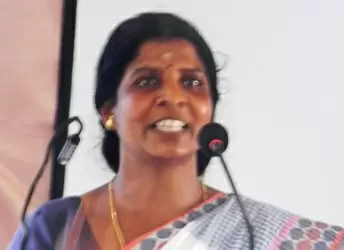Battling the twin curses of alcoholism and malnutrition is a way of life for the women of Attappadi
22-December-2014
Vol 5 | Issue 51
Located at the northeastern edge of Palakkad district, Attappadi is the largest and only tribal settlement in Kerala. Whereas the landscape, a lush symphony of forests, rivers and mountains, is indeed awe-inspiring, a closer look at the unfortunate lives of the tribal communities living here is indeed a rude wake up call to the reality.
In a state that is often referred to as the “land of women” – it has the highest sex ratio and literacy rate in the country – this pocket is an unfortunate exception.
 |
|
K. Kali is a tribal activist from the Irula community at the Naickerpady settlement, and a member of Thayikula Sangham, a group of tribal women fighting alcoholism (Photo: Kamayani Bali-Mahabal\WFS)
|
A vicious nexus of ill health, socio-economic backwardness and exclusion conspire to severely affect the hardworking tribal women: nearly 50 per cent are subjected to sexual exploitation while 53 per cent of unwed mothers are in the 20 to 25 age group.
Moreover, as most men blow up their entire wages on country liquor called hooch, the women are doomed to shoulder the entire burden of the family.
According to K. Kali, a tribal activist from the Irula community at the Naickerpady settlement, and member of Thayikula Sangham, a group of tribal women fighting alcoholism, “In a deeply patriarchal society, education teaches women only to be good wives and mothers.
“So imagine the fate of the poverty-ridden, largely illiterate tribal women. The twin curses of alcoholism and malnutrition make sure that the women in Attappadi spend their lifetime struggling for survival. ”
Indeed, it’s a combination of livelihood and food insecurity driven by landlessness, loss of traditional agricultural techniques and knowledge of indigenous foods as well as a lack of access to adequate healthcare that has caused widespread malnutrition in the region. In fact, in the last two years, close to 100 child deaths have been reported.
“Agriculture used to be the main source of livelihood for most of the adivasis, which was supplemented by collecting forest produce and hunting. When I was a child, we used to cultivate ragi, chama (bajra), thomara (horse gram), maize, pulses and vegetables.
“We also picked a variety of wild greens and tubers and had meat of small animals from forests. That’s how we managed to eat a well balanced diet consisting of iron, carbohydrates and proteins. However, with the influx of the settlers from outside that resulted land alienation, my people have had to give it all up,” elaborates Kali.
In the eyes of Kali’s 92-year-old mother, ‘development’ has not just put an end to their way of life - that she feels was more equitable and nature-friendly - but also to their happiness and prosperity.
“She always tells me: ‘we were truly happy in those days. A kilo of ragi planted on an acre of land would yield a quintal of produce. We only used natural fertiliser like compost. No one was a labourer then; we cultivated together,” narrates Kali.
Today, the situation is quite the opposite and, consequently, very dire. This obviously has adversely impacted the women folk the most. “These days, around 73 per cent of tribal women make a living as farm hands, earning wages as low as Rs 50.
“There are hundreds of young unwed mothers in the tribal-dominated areas who share a similar plight of sexploitation and betrayal at the hands of men from outside their community.
“Raped and ravaged, even adivasi women in the Wayanad region are paying a heavy price. As if abuse at the hands of outsiders is not enough, our own men are not too far behind when it comes to hurting and taking advantage. Alcoholism has done them in,” she says in anger.
Kali is one of the leaders fighting alcoholism and atrocities against women in Attappadi. “Men spend all their earnings on ‘hooch’ and women work day and night to keep the family going. Pregnant women work till their child is born and then are back just a few days after delivery because it’s a matter of putting food on the table,” she states.
Quite ironically, Attappadi is the only block in Kerala where there is a complete prohibition on liquor. After an order from the district administration in 1995, all toddy shops in the block closed down and the tapping of toddy was banned.
“It was one of the biggest blunders of the state government, as ever since the ban, every tribal settlement has turned into an illicit liquor centre. Local hooch distillers have been using hazardous substances like used battery fluid to increase the potency of their output. As a result, consumption of liquor has shot up exponentially,” Kali elaborates.
The vociferous activist firmly believes “what ails Attappadi is the government’s lack of understanding of local life in a region where people still practice age-old customs”.
While the tribals earlier hunted or foraged for food in the forests, modern laws prevent them from doing this now. Further, their conventional system of inter-cropping pulses and vegetables has been abandoned for a water-intensive mono-cropping of cereals.
“Nobody asked us what we really want. Policies and projects are planned by others and imposed on us. Over the years, many of us have lost our fertile lands.
“The Forest Rights Act, 2006, too, has not been properly implemented. Do you know that Attappadi has the potential to produce vegetables for all of Kerala? The government could intervene to remove all middlemen and help the locals produce and market vegetables and fruits so that they can directly reap the benefits,” she suggests.
At present, the tribals are forced to depend on the Public Distribution System (PDS) for their rations. “But we are yet to adjust to this system. We generally don’t like rice provided from the fair price shops,” points out Kali, adding, “Most families cook rice and one curry in a day and eat the same thing two or three times. There is no variety or nutrition in the diet.”
The need of the hour is a radical change - albeit one that is tailor-made to the needs of the people. “A culturally sensitive approach to the implementation of Mahatma Gandhi National Rural Employment Guarantee Act should be looked into.
“This essentially means that the chief, or mooppan, of each tribal hamlet should be granted powers to plan, execute, monitor and evaluate the rural employment scheme in the tribal areas belt.
“Formation of tribal village sabhas and self-help groups has to be encouraged. Engineering, medical and higher education institutions, with a special provision for tribal students, should be set up in the area,” recommends Kali.
Clearly, whether it’s Kerala – that enjoys high human development indices - or any of its relatively worse off counterparts across India, the fate of tribal women is doomed to drudgery and disillusionment. But if there are problems then there are solutions as well… - Women's Feature Service














